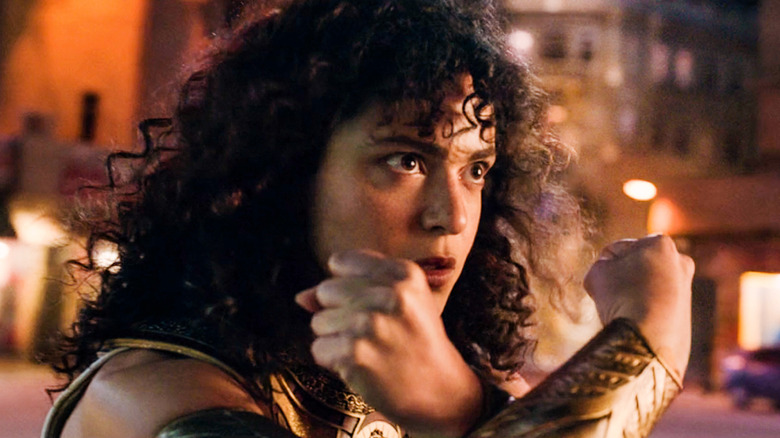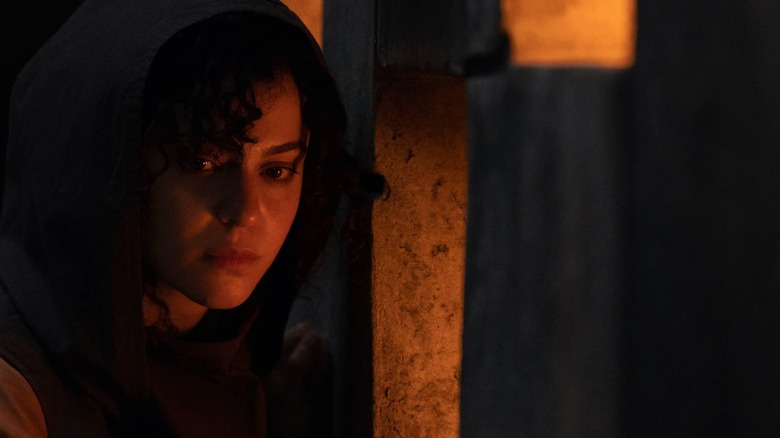Moon Knight's Introduction Of Scarlet Scarab Had The Producer 'Dancing Around The Room'
Like far too many studios today, Marvel has historically struggled to achieve a satisfying level of representation with its sprawling, multimedia universe. Almost exactly 10 years ago, "The Avengers" first burst onto the scene and changed the landscape of blockbusters forever ... but for all the movie's charms, it still features a core cast of superheroes without a single person of color on the roster and only one woman.
Some improvements have been made in the decade since, with second-tier "sidekick" characters getting a long overdue chance to shine in the spotlight — if not in feature films as the main lead (though that will soon change), then at least on Disney+ streaming with shows of their own. Characters like Wanda Maximoff, Sam Wilson, Kate Bishop, and more were given room for growth, helping the Marvel Cinematic Universe feel just a little more varied and dynamic than it's remained for too many years.
Marvel's latest attempt to marry interesting storytelling with a richer and more diverse cast of characters recently came to a conclusion with "Moon Knight," which boasted Egyptian talent on both sides of the camera. In addition to the directing work of Mohamed Diab, who hasn't shied away from voicing his strong opinions on representation in Hollywood in general, the casting of May Calamawy as Layla El-Faouly represented a major milestone in the MCU. And as we found out in the finale, Layla's presence had been steadily building up to taking on the mantle of a superhero identity — the Scarlet Scarab. In an interview with Marvel.com, consulting producer Sara Goher opened up about the importance of finally seeing her suit up in all her glory, resulting in her "dancing around the room" once the spectacular costume was fully unveiled.
"I've read interviews [with Marvel Studios president Kevin Feige] about how he's shaping Marvel Studios and taking it into a direction of really progressive thoughts and ideas. Marvel Studios is really pushing for that and really supportive about it. I think inside all of us, [these characters] are like your inner child dreaming."
'A magical moment'
At a certain point late in the episode, the subtext is made into text when Layla leaps into action to save a buss full of civilians as fighting breaks out in the streets of Cairo. One grateful onlooker asks pointedly if Layla is an Egyptian superhero, to which she doesn't miss a beat in responding, "I am." Goher describes that as "a magical moment for lots of people around the world. It's great that Marvel is really at the helm of this movement on this scale to make sure that everyone feels like they belong." It may seem like a drop in the bucket in the grand scheme of things, but look no further than Diab himself, who took to Twitter to explain just how meaningful a character like Layla can be to young fans.
Since my daughter was 4, she wanted to straighten her hair. She never saw someone who looked like her in the media. Today this changes with LAYLA, the first Egyptian superhero. Proud to be a part of it! #LaylaElFaouly #MoonKnight pic.twitter.com/BJvEENiqJW
— Mohamed diab محمد دياب (@MohamedDiab678) May 5, 2022
Elsewhere in the interview, Calamawy herself spoke up about the pressure inherent in taking on such a groundbreaking role.
"I had to really sit with it and be like, I cannot represent every Arab woman or every Egyptian woman ... I just hope that all Arab women can watch that and feel like a superhero, and that they have that space on that big scale. I hope that the people who can relate to Layla feel seen and excited, and people who don't, that's okay. There's space for everyone. I'm just the first. There's many more that can come. It's an honor. It's an honor just to be able to represent or to be Middle Eastern, and shine a light on that region."
One series on its own can't fix decades and decades of lackluster representation in our media, of course, but the actor put it perfectly — it's a start, at least. Even with the status of a second season for "Moon Knight" remaining somewhat more complicated than it may seem, it's likely that we haven't seen the last of Calamawy as Layla. Hopefully the character will continue to open doors for even more representation down the line.
All 6 episodes of "Moon Knight" are currently streaming on Disney+.

